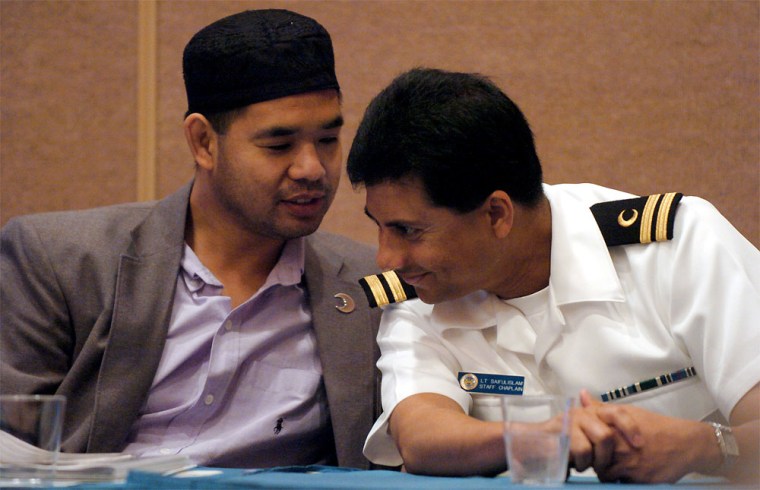As both Democrats and Republicans sought their support, American Muslim leaders wrapped up their community’s largest convention Sunday still debating whether to endorse a presidential candidate.
And despite bitter feelings over how President Bush has conducted the war on terrorism, Muslim leaders said an endorsement for his challenger, Democratic Sen. John Kerry, was not guaranteed.
Independent Ralph Nader traveled here Saturday and made an aggressive pitch for their backing in a closed-door meeting held separately from the conference.
“We are still deliberating amongst ourselves,” said Salam al-Marayati, head of the Muslim Public Affairs Council, a public policy group based in Los Angeles. A decision is expected next month from the American Muslim Taskforce, an umbrella group for major Muslim organizations.
Key battleground constituencies
American Muslims hold special importance this election year because they have strong communities in battleground states such as Michigan, Ohio and Florida. Also, immigrant Muslims tend to be educated professionals — an attractive demographic for both parties.
In 2000, leaders of major Muslim organizations made their first endorsement in a presidential race, choosing Bush over Democrat Al Gore. The Texas governor had indicated he was sympathetic to their concerns about using secret evidence in immigration hearings.
However, many rank-and-file Muslims — especially U.S.-born African Americans, who usually vote overwhelmingly Democratic — opposed that 2000 decision. Following the Sept. 11, 2001, attacks, Bush enacted anti-terrorism policies that many Muslims felt violated their constitutional rights. The Muslim leaders who had organized the Bush endorsement said openly they had made a mistake.
Still, Bush did not give up on the Muslim vote.
Little chance of Bush endorsement
About a year ago, Al-Marayati said the Bush administration had increased contacts with Muslim leaders, inviting them for briefings with the Department of Justice and the White House faith-based office.
Still, it appears Bush has little chance of winning the leaders’ endorsement, given widespread Muslim anger over his policies.
Nader, in an interview, said he alone was addressing Muslim issues. “We are the only ones who are speaking up on Israel, the Palestinians, civil liberties and malicious prosecution,” he said.
Muqtedar Khan, a political scientist and author of “American Muslims,” has tried to counteract Nader’s appeal, telling the community that a vote for Nader would ultimately help Bush. Yet some Muslim leaders say the Kerry campaign has missed opportunities to capitalize on Muslim resentment of the president.
Kerry under fire, too
At the convention this weekend, organized by the nonpartisan Islamic Society of North America, several speakers said Kerry had become too timid on civil rights issues. They said his pledge on repealing parts of the USA Patriot Act, which gave the government broad new powers to monitor citizens, did not go far enough.
The Bush administration has defended the Patriot Act as critical to national security.
“I haven’t seen John Kerry delivering on his early promises,” said Nihad Awad, executive director of the Council on American-Islamic Relations, an anti-defamation group based in Washington.
Others complained that high-level Kerry staff have been slow to reach out to Muslim leaders.
However, Aslam Abdullah, editor of Minaret magazine, who is helping organize Muslim support for Kerry, said some Muslim leaders were thinking too narrowly.
‘Who is more capable ... ?’
“It is not whether Bush meets with Muslims or whether Kerry meets with Muslims,” he said in a phone interview. “The question is who is more capable of steering the country out of the trouble it is in?”
Whatever the task force decision, it is not clear that they can deliver the Muslim vote. They have sponsored voter registration drives and “town hall” meetings about the election nationwide, but many American Muslims are not affiliated with national Muslim organizations and may not be influenced by an endorsement.
Nuzhat Ahmed of Cedar Rapids, Iowa, said at the convention that she would decide on her own who to vote for — and would encourage others to vote, no matter what candidate they chose.
“We want Muslim participation in politics,” she said, “so our voices can be heard.”
